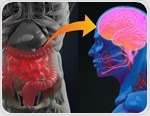|
| | January 15, 2018 | |
| | |
| | The latest gastroenterology news from News Medical | |
|
|
|
 |
| | | |  Mount Sinai study uncovers potential link between Crohn's and Parkinson's in Jewish population Mount Sinai study uncovers potential link between Crohn's and Parkinson's in Jewish population Mount Sinai Researchers have just discovered that patients in the Ashkenazi Jewish population with Crohn's disease (a chronic inflammatory of the digestive system) are more likely to carry the LRRK2 gene mutation. | |
 |
| | | |  Penile Intraepithelial Neoplasia Treatments and Outcome Penile Intraepithelial Neoplasia Treatments and Outcome Penile Intraepithelial Neoplasia (PeIN or PIN), also known as penile squamous cell carcinoma, is a premalignant condition of the penile epithelium. The most sensitive way of detecting PeIN is by applying acetic acid to the skin of the male genitalia. The treatment procedures for PeIN include topical chemotherapy, laser therapies (Nd:YAG, and Co2), cryotherapy, photodynamic therapy, and surgical excision. | |
 |
| | | |  Study reveals increased risk of common cancers among female night shift workers Study reveals increased risk of common cancers among female night shift workers A new study published in the journal of American Association for Cancer Research, Cancer Epidemiology, Biomarkers & Prevention, has revealed the increased risk of breast, skin, and gastrointestinal cancers among women who work night shifts. | |
|
|
|
 |
| |  There is growing recognition within the medical and scientific communities of the link between the microbial composition of the intestines and the central nervous system. This is known as the “gut-brain axis” and encompasses bidirectional communication channels between the central nervous system, the enteric nervous system, and the endocrine system. There is growing recognition within the medical and scientific communities of the link between the microbial composition of the intestines and the central nervous system. This is known as the “gut-brain axis” and encompasses bidirectional communication channels between the central nervous system, the enteric nervous system, and the endocrine system. | |
|
| |  For a few years now several companies have been marketing “raw water” that has been bottled directly from natural sources such as springs and small water bodies without filtration and treatment. For a few years now several companies have been marketing “raw water” that has been bottled directly from natural sources such as springs and small water bodies without filtration and treatment. | |
|
| |  Immune cells that process food and bacterial antigens in the intestines control the intestinal population of fungi, according to a new study from Weill Cornell Medicine scientists. Immune cells that process food and bacterial antigens in the intestines control the intestinal population of fungi, according to a new study from Weill Cornell Medicine scientists. | |
|
| |  It is well known that healthy eating increases our general sense of wellbeing. Researchers at Friedrich-Alexander-Universität Erlangen-Nürnberg have now discovered that a fiber-rich diet can have a positive influence on chronic inflammatory joint diseases, leading to stronger bones. It is well known that healthy eating increases our general sense of wellbeing. Researchers at Friedrich-Alexander-Universität Erlangen-Nürnberg have now discovered that a fiber-rich diet can have a positive influence on chronic inflammatory joint diseases, leading to stronger bones. | |
|
| |  Binge drinking is the consumption of alcohol in large amounts in a very short time. It is normally described as drinking alcohol beyond the recommended levels of 4 units per day for women and 6 units per day for men. Drinking too much alcohol may be detrimental to health. In the USA, binge drinking accounts for more than 90% of the total alcohol consumed by youngsters below the age of 21 years. Binge drinking is the consumption of alcohol in large amounts in a very short time. It is normally described as drinking alcohol beyond the recommended levels of 4 units per day for women and 6 units per day for men. Drinking too much alcohol may be detrimental to health. In the USA, binge drinking accounts for more than 90% of the total alcohol consumed by youngsters below the age of 21 years. | |
|
| |  Alcohol when over-consumed for the first time causes severe effects. Heavy drinking greatly affects not only the liver, but also many other parts of the body system. Alcohol when over-consumed for the first time causes severe effects. Heavy drinking greatly affects not only the liver, but also many other parts of the body system. | |
|
|
|
|







No hay comentarios:
Publicar un comentario